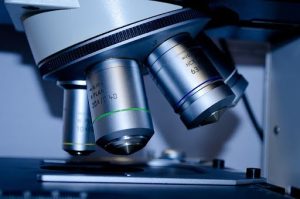Step into a world where the once-distant dreams of science fiction are rapidly becoming our reality. The marriage of biology and technology has ushered in an era where the impossible is now possible, from editing our very DNA to revolutionizing the way we learn about life itself. This article will take you on an exploration of how this powerful synergy is not just changing the landscape of science but also profoundly impacting our everyday lives.
Historical Milestones
The Lens That Opened New Worlds
The journey into the microscopic began with a simple glass lens. The microscope, a beacon of the scientific revolution, allowed pioneers like Antonie van Leeuwenhoek to glimpse the teeming life invisible to the naked eye. This breakthrough set humanity on a path of discovery, revealing the cellular basis of life and opening a window into the intricate workings of organisms.
The Blueprint of Life Unveiled
Fast forward to the 20th century, where the electron microscope and X-ray crystallography brought us face-to-face with the double helix of DNA. These technologies didn’t just magnify our view but expanded our understanding, allowing scientists like Rosalind Franklin and James Watson to unravel the secrets of genetics and heredity.
Decoding Our Genetic Legacy
The Human Genome Project, a monumental collaboration, harnessed the power of computers to map human DNA, providing a roadmap of our genetic makeup. This achievement was not just a scientific milestone; it was a catalyst for a new era of medicine and biotechnology, setting the stage for personalized treatments and a deeper understanding of human biology.
Modern Marvels
CRISPR: The Genetic Revolution
CRISPR technology has emerged as a beacon of hope, offering the precision to edit genes with unprecedented accuracy. This tool has the potential to eradicate genetic diseases, with recent trials showing promise in treating conditions like sickle cell anemia. The implications of CRISPR extend beyond medicine, with applications in agriculture to create more resilient crops.
The Rise of Synthetic Biology
The field of synthetic biology, where scientists engineer new forms of life, is another testament to the power of biotechnology. Innovations like lab-grown organs are not just scientific curiosities; they represent hope for thousands awaiting transplants and a future where organ shortages are a thing of the past.
The convergence of big data and machine learning in biology is personalizing healthcare. By analyzing genetic information, we can now tailor treatments to individual needs, predict disease risks, and even anticipate the spread of infectious diseases with greater accuracy.
Interactive Learning
The Virtual Lab
The digital revolution has transformed biology education, turning the traditional classroom into a virtual laboratory. Students can now perform experiments and explore biological processes through simulations, breaking down the walls of the classroom and making science accessible to all.
Engaging the Senses
Multimedia elements in biology education do more than just inform; they captivate. By using animations to visualize complex processes and interactive models to explore molecular structures, educators are catering to diverse learning styles and making the abstract tangible.
Connecting Minds Across the Globe
Online platforms have turned the world into a classroom, connecting students and educators from different cultures and backgrounds. This global network not only enriches the learning experience but also fosters international collaboration, preparing students to tackle the world’s most pressing biological challenges.
IB Biology: A Curriculum for the Future
IB biology exemplifies the integration of technology in education, using digital tools to bring complex biological concepts to life. The curriculum encourages students to think critically and apply their knowledge in practical ways, preparing them for the challenges of the future.
Empowering Global Learners
The IB biology program doesn’t just teach biology; it connects learners to a global community. Through technology, students collaborate on projects, access international resources, and gain a broader perspective on the impact of biology in a global context.

Global Impact
Collaboration Across Continents
Technology has erased geographical barriers, enabling scientists to collaborate across continents in real-time. This global teamwork accelerates research, fosters innovation, and leads to breakthroughs that benefit humanity as a whole.
In regions where resources are scarce, technology is a lifeline. Mobile health applications and telemedicine are bringing essential healthcare services to remote areas, democratizing access to medical knowledge and care.
A Global Response to Global Challenges
The interconnectedness provided by technology is our best defense against global challenges like pandemics and climate change. By sharing data and resources, the scientific community can mount a coordinated response, ensuring that no corner of the globe is left in the dark.
Ethics and Accessibility
The advancements in biotechnology come with a complex moral landscape. As we explore the potential of gene editing and data collection, we must engage in ethical debates and ensure that these technologies are used responsibly and for the greater good.
Bridging the Digital Divide
The promise of technology in biology must be accessible to all. Efforts to bridge the digital divide are crucial in ensuring that the benefits of these advancements are not limited to affluent societies but are shared globally.
Inclusion in the Age of Technology
Technology has the power to make biology more inclusive. By developing tools that accommodate diverse needs, we can create opportunities for people with disabilities and underrepresented groups to participate fully in the scientific community.
The Future Is Now
Artificial Intelligence in Biology
Artificial intelligence is poised to transform biology, offering new ways to analyze complex data and accelerate discoveries. From identifying new drug candidates to predicting disease outbreaks, AI is becoming an indispensable tool in the biologist’s arsenal.
Robots in the Research Lab
Robotics is bringing a new level of precision and efficiency to biological research. Automated systems can handle repetitive tasks, freeing up researchers to focus on the creative aspects of science and paving the way for new discoveries.
Integrating AI and Robotics
The integration of AI and robotics is creating a powerful synergy in biology. These technologies are not just tools but collaborators that enhance our ability to explore and understand life, promising a future where biological research is more efficient, accurate, and innovative.
Overcoming Obstacles
Addressing the Challenges
The integration of technology in biology is not without its challenges. Issues of access, data security, and the potential impact on employment must be addressed to ensure that the benefits of these technologies are realized responsibly and equitably.
Ethical Considerations in a New Era
As we push the boundaries of what’s possible, we must remain vigilant about the ethical implications of our advancements. Engaging in open dialogue and establishing clear ethical guidelines will be essential as we navigate this new era.
Regulation and Responsibility
Keeping pace with rapid technological advances requires robust regulation. Ensuring the safety and ethical deployment of new biotechnologies is a shared responsibility that calls for collaboration between scientists, policymakers, and the public.
A Call to Action for Synergistic Progress
The synergy between biology and technology is a driving force that is reshaping our world and expanding the boundaries of what we can achieve. From the historical milestones that paved the way to the modern marvels that push the limits, this relationship is pivotal to our future.
It’s now up to us to engage with this synergy, whether through education, career choices, or informed citizenship. We must champion responsible innovation and ensure that the benefits of these advancements are shared by all. Let’s embrace the fusion of biology and technology, for it holds the key to a healthier, more knowledgeable, and more connected world.












